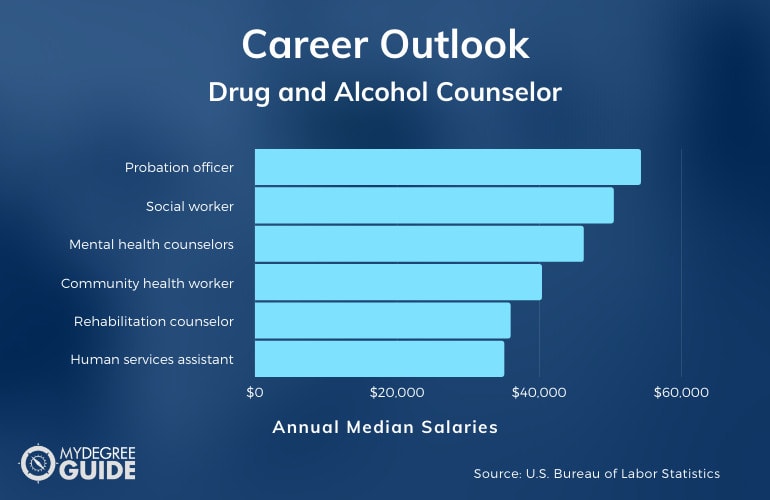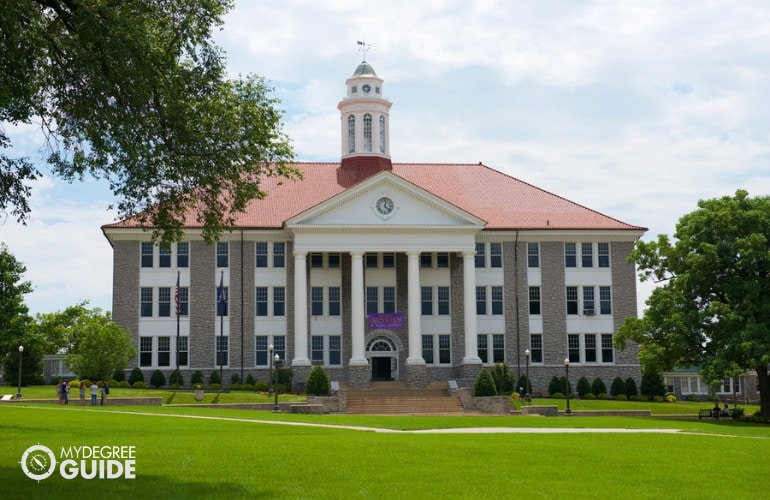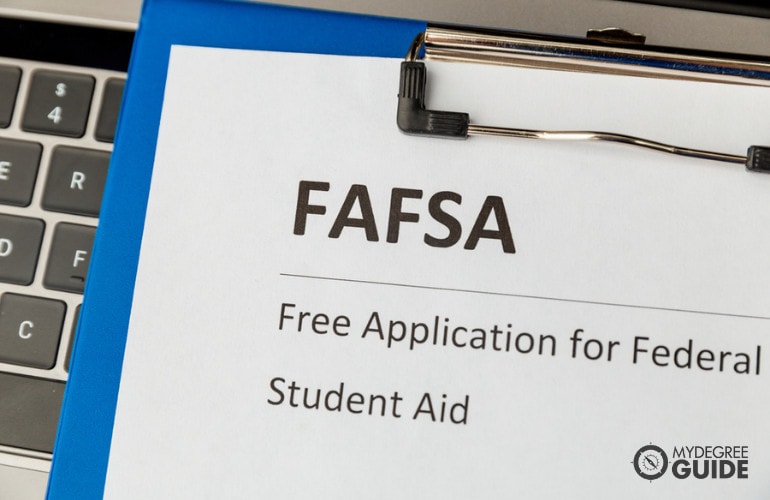Looking for Drug and Alcohol Counselor Degree Online Programs for 2024? Compare substance abuse counseling schools and online degrees.

You know that people with drug and alcohol dependencies need your help, so you may be determined to make addiction counseling your life’s mission.
What addiction counseling degrees can help you achieve that goal?
Editorial Listing ShortCode:
Colleges offer substance abuse studies at the associate, bachelor, master, and doctoral levels. Earning a bachelor’s degree and then advancing to a master’s degree may be a reliable educational path that can help prepare you for a variety of career options.
Earning these degrees online gives you the flexibility to complete your addiction studies according to your schedule.
Online Drug and Alcohol Counseling Degrees
Depending on your interests and where you are in your educational career, you may want to read up on one of the following degree tracks.
Click on the degree that most interests you to jump to that section of the guide:
Bachelor’s
- Applied Behavioral Science
- Human Services
- Psychology – Addictions & Recovery
- Psychology – Clinical & Counseling Psychology
Master’s
- Addiction Studies
- Counseling – Addictions & Recovery
- Psychology – Addictions
- Master’s in Social Work
Some of these degrees will help prepare you for licensure, while others will not.
Bachelor’s of Applied Behavioral Science

In the study of applied behavioral science, you’ll explore why people behave in the ways that they do. Your studies will touch on several disciplines, including sociology, economics, communications, and psychology.
You may take courses like Introduction to Behavioral Science, Working with Groups, and Ethical Foundations.
Editorial Listing ShortCode:
Applied behavioral science is a research-heavy program. You may learn to collect and analyze data and then find practical applications for your conclusions. This program could help prepare you to work in the fields of social services, drug rehabilitation or teen outreach.
Bachelor’s in Human Services

If you plan to work in community or non-profit agencies, you may want to start your drug counseling education with a bachelor’s degree in human services.
Your coursework could include classes like Program Budgeting, Public Policy, Children and Family Services, and Foundations of Case Management.
Editorial Listing ShortCode:
You’ll study topics like psychology, sociology, ethics, human development, and conflict resolution. Some schools offer degree concentrations like Drug and Alcohol Addictions, Youth Services, and Criminal Justice.
Your degree could help prepare you to be a case manager, a probation officer, a social worker, or a counseling assistant.
Bachelor’s in Psychology – Addictions & Recovery

At the undergraduate level, you may gain valuable skills that can help you get started in the field of drug counseling. The classes that you take may include Pharmacology for Alcohol Dependency, Substance Abuse Treatment, and Addiction Psychology.
In addition to these addiction-focused classes, you may also learn about many branches of psychology, including developmental, abnormal, cognitive, and clinical.
Editorial Listing ShortCode:
At some schools, this online bachelor’s program can help prepare you to take a few levels of the National Certified Addiction Counselor exam.
Potential jobs include health educator, rehabilitation counselor, non-licensed addiction counselor, social worker, and community health worker.
Bachelor’s in Psychology – Clinical & Counseling Psychology

For a strong foundation in listening to others and helping them work through their problems, consider focusing your studies on clinical counseling skills. The knowledge that you gain may be transferrable to other areas of counseling in addition to drug and alcohol treatment.
Your coursework may include Counseling Theories, Thinking Psychologically, Counseling in Diverse Settings, Leading Counseling Groups, and Case Management. After graduation, you may work in a residential facility or a human services agency.
Editorial Listing ShortCode:
Keep in mind that this undergraduate degree won’t qualify you for licensure, but it may serve as a good foundation for graduate work in clinical counseling.
Master’s in Addiction Studies

Addiction treatment requires a unique set of counseling and therapeutic skills, and you may acquire them in an addiction studies program.
Your coursework may include Addiction Treatment Theories, Preventing Drug Relapses, and Ethics for Addiction Professionals.
Editorial Listing ShortCode:
Elective options can help you create a course of study that aligns with your career goals; the available electives may cover topics like gambling, youth services, and trauma care. You’ll probably need to complete an internship as part of your degree plan. Most programs are sufficient for licensure purposes, but you’ll need to confirm eligibility in your state.
Master’s in Counseling – Addictions & Recovery

A master’s degree may help prepare you to work one-on-one with clients as a licensed counselor.
In an addictions and recovery program, your courses may include Crisis Intervention, Psychopharmacology for Addiction Treatment, Diagnostic Assessments, and Counseling in Group Settings.
Some programs provide all the credit hours required for a licensure exam. Others give you enough credits for a certification program, but you’ll need to take a few additional classes to pursue licensure.
Editorial Listing ShortCode:
Once you are licensed, you may work as a drug and alcohol counselor in medical clinics, community agencies, residential facilities, correctional facilities, rehab centers, or private practices.
Master’s in Psychology – Addictions

Are you interested in learning more about the brain processes that are involved in addiction?
You may be able to take the facts and theories that you learn in a graduate-level psychology program and apply them to real-life therapies and treatments for people in need.
Editorial Listing ShortCode:
You may take classes in co-occurring mental health disorders, medications for addiction treatment, neurobiology, and case management. This program track may not be sufficient for licensure requirements, but it may get you ready to enter a doctoral program so that you may become licensed as a clinical psychologist.
Master’s in Social Work

If you care about the wellbeing of others, then you might be a good fit for a career in social work.
Students in social work programs study topics like human behavior, group counseling, leadership, community intervention, cognitive behavioral therapy, and lifespan development.
Editorial Listing ShortCode:
An internship will often be necessary for gaining hands-on experience. At many schools, both clinical and leadership tracks are available.
Programs are typically designed to prepare you to become a Licensed Master Social Worker (LMSW) or a Licensed Clinical Social Worker (LCSW), but your state’s titles and regulations may vary.
How to Become a Drug and Alcohol Counselor

Wondering how to become an addiction counselor? Some entry-level positions may require only a high school diploma or an undergraduate degree. Advancing in the field will often require more education, though.
For licensed counselor positions, most states require you to hold a master’s degree.
You can expect the path to licensure to look something like this:
- Earn a bachelor’s degree, preferably in drug counseling or psychology.
- Earn a master’s degree in addiction counseling.
- Gain counseling experience in supervised settings.
- Take and pass the licensing exam used by your state.
- Receive your license and begin to practice independently.
Remember to renew your license on a regular basis as required by your state.
Coursework for a Drug and Alcohol Counseling Degree

To prepare for a job as a drug and alcohol counselor, students spend a good deal of time learning about addictions and treatment approaches.
Degree problems often cover subjects like psychology, social work, research, human development, sociology, and statistics.
Each school is different, but your university may have you take classes like:
- Cognition and Brain Function: You’ll study the science behind recall, learning, and other brain functions, and you’ll be able to make connections to addiction’s effects on the brain.
- Counseling in Group Settings: People with substance abuse disorders often discuss their addictions in group settings, so this class will equip you with skills for facilitating those groups.
- Human Lifespan Development: You’ll learn about normal physical and psychological development in this course and discuss ways that mental health disorders, addiction, and other problems can disrupt typical development.
- Mental Health and Psychopathology: This class will provide a survey of common mental health disorders; the curriculum may include coverage of causes, symptoms, and treatment options.
- Theories of Addiction: This overview of substance abuse and other addictive behaviors will cover addiction prevention, causes, results, and treatments.
Many programs also include practicum or internship components in which students put their classroom knowledge into practice.
Drug and Alcohol Counselor Jobs

If you’re studying drug and alcohol counseling, it might be because you want to become a substance abuse counselor or a mental health counselor.
Those are in-demand roles, and the Bureau of Labor Statistics expects the number of jobs to increase 25% for the next 10 years.
Other job possibilities include:
- Social worker: You might manage cases, supervise other social workers, or provide one-on-one counseling.
- Human services assistant: You may serve clients in a community or non-profit program.
- Probation officer: Drug offenders may need to maintain contact with you as a condition of their criminal sentences.
- Rehabilitation counselor: In a rehab program or a residential facility, you may help people prepare to live on their own without relying on drugs.
- Community health worker: You might run community drug prevention or education programs.
Any of these careers may give you the reward of helping people turn their lives around.
Drug and Alcohol Counselor Salary

Although personal satisfaction is a great reason to choose a particular career path, you also need to earn a livable wage.
Here’s what you can expect, on average, from these careers:
| Careers | Annual Median Salaries |
| Probation Officer | $54,290 |
| Social Worker | $50,470 |
| Substance Abuse and Mental Health Counselor | $46,240 |
| Community Health Worker | $40,360 |
| Rehabilitation Counselor | $35,950 |
| Human Services Assistant | $35,060 |
Salaries vary across the country and often increase with experience.
Drug and Alcohol Counselor Certification

Drug and alcohol counselors may be eligible for a variety of certifications and licensures. The options you choose to pursue may depend on your area of interest and the requirements for addiction counselors in your state.
Certification and licensure are not always the same. You may be eligible for some certifications after earning a bachelor’s degree, but licensure necessitates earning a master’s and meeting other state requirements.
Certifications and licensures to consider include:
- Licensed Clinical Social Worker (LCSW)
- Licensed Master Social Worker (LMSW)
- Licensed Professional Clinical Counselor (LPCC)
- Master Addiction Counselor (MAC)
- National Certified Addiction Counselor, Level I (NCAC I)
- National Certified Addiction Counselor, Level II (NCAC II)
- Nicotine Dependence Specialist (NDS)
To earn these credentials, you will typically need to pass examinations from the National Certification Commission for Addiction Professionals (NCC AP) or another industry organization.
Counseling Schools Accreditation

For a future counseling career, you might want to look for a substance abuse counseling program with programmatic accreditation from the Council for Accreditation of Counseling & Related Educational Programs (CACREP). This organization reviews colleges’ counseling programs to determine whether they meet the highest standards for counselor education.
Enrolling in a CACREP program is an excellent way to ensure you’re fully prepared for certification exams and employment.
In addition, the entire school must be accredited by a regional accrediting body. All reputable colleges have this type of accreditation. Without it, you can’t be confident that you’re attending a high-quality school.
Financial Aid

Preparing to start either a bachelor’s or master’s program is a big choice and a big investment. As you begin applying to universities, make sure that you’re also applying for all of the financial aid that you can.
Here are some places to look for funding:
- Federal government
- Your state government
- Private organizations
- Your school
- Your employer
Scholarships and grants do not need to be repaid, though they will have some requirements and stipulations that you have to meet to qualify. Loans are deferred until after you graduate, meaning you should be able to enter the workforce before you have to start paying on them.
Professional Counseling Organizations

Membership in a professional association may be a perfect complement to your university studies.
Groups to consider include:
- American Counseling Association: ACA is committed to supporting counselors of all types, including addiction counselors.
- International Association of Addictions and Offender Counselors: IAAOC addresses the unique needs of counselors who deal with addicted people and criminal offenders.
- NAADAC, The Association for Addiction Professionals: NAADAC provides networking opportunities for counselors, educators, healthcare providers, and others in the field of substance abuse.
You may join these organizations as a student and maintain your memberships throughout your career.
How Much Do Drug and Alcohol Counselors Make?

On average, addiction counselors earn about $22.23 per hour. Licensed Professional Counselors and Licensed Clinical Social Workers are usually at the higher end of the scale, and caseworkers and social workers are at the lower end.
How Long Does It Take to Become an Addiction Counselor?
You should expect it to take over six years to become a licensed addiction counselor. Bachelor’s degrees usually take four years, and master’s programs typically take two years. Accelerated programs may speed up those processes.
Before licensure, you must log several thousand hours of professional experience; requirements vary by state.
Are Continuing Education Credits a Requirement in Counseling?
You will need to earn continuing education credits to maintain your licenses or certifications. The specifics will depend on the requirements of your state or your certification agency.
Ready to Get Started?

You’re about to embark on a very rewarding career path. Here are your next steps:
- Decide on a concentration.
- Narrow down your choice of schools by degree specialization.
- Apply to 5-10 universities.
- Seek financial aid.
When you get your acceptance letters, be sure to consider any scholarships they offer compared to the total cost of the program.

